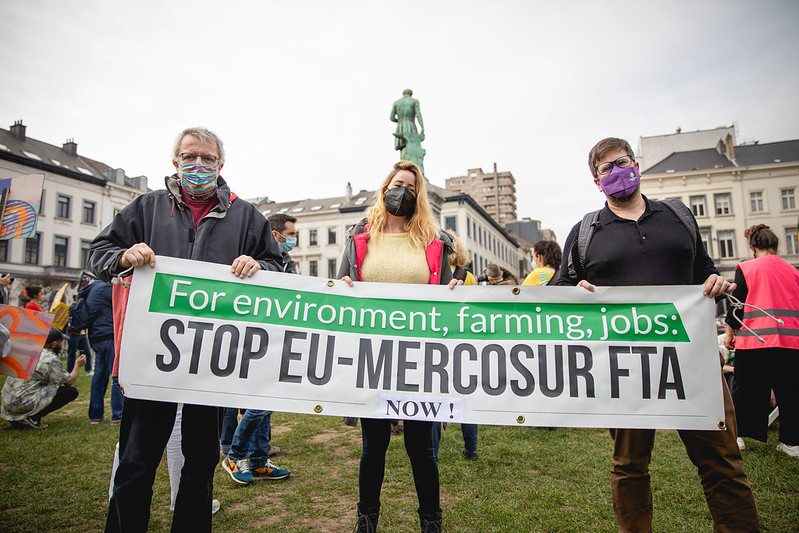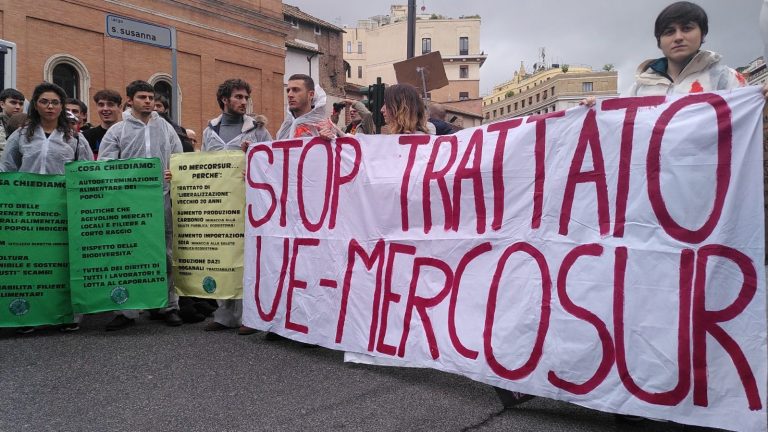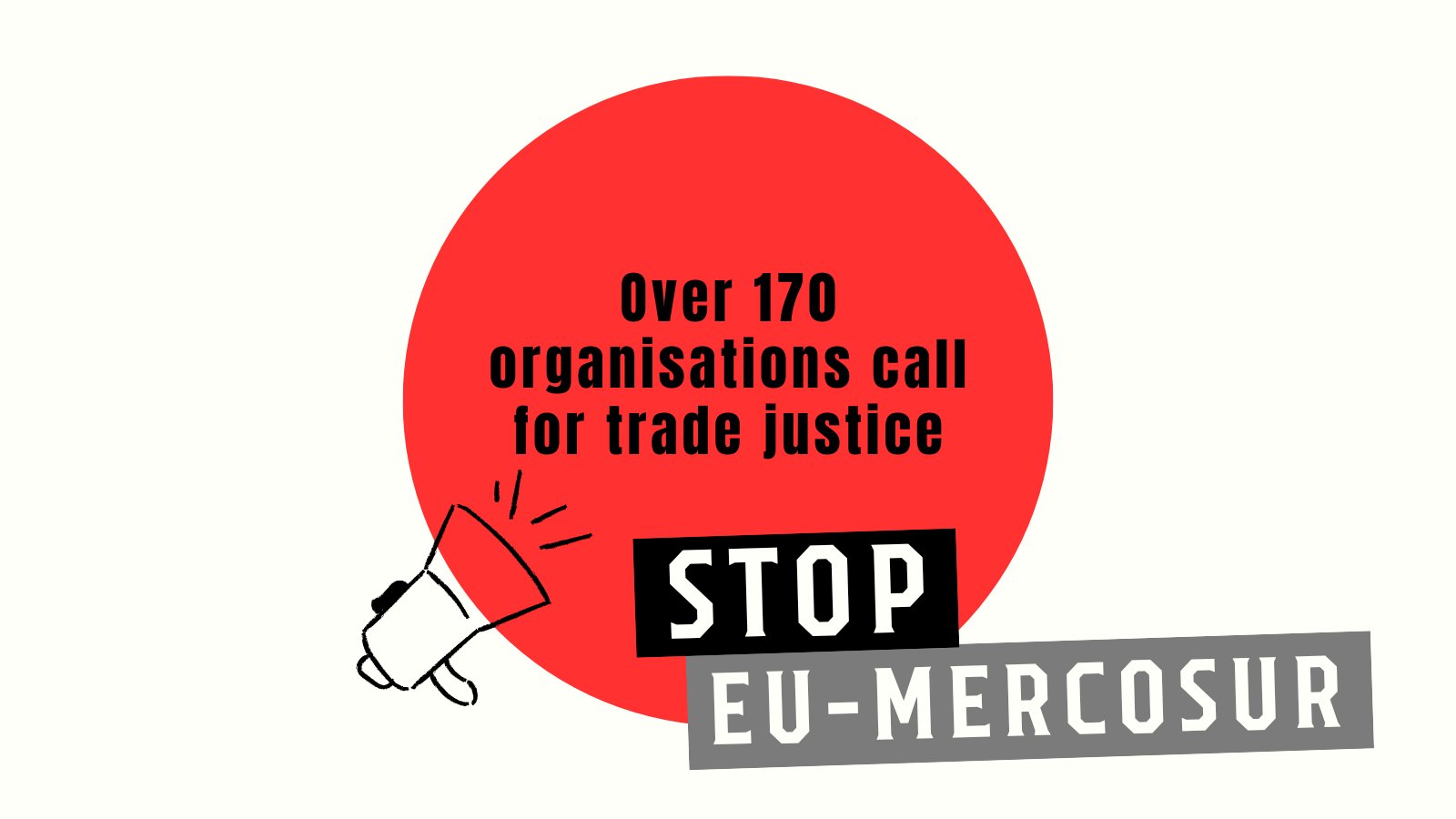
Photo: The Left / CC BY-NC-SA 2.0
Voices from the South Newsletter

Bilaterals.org
/ S2B Network
Bilaterals.org is a collaborative, open-publishing website that supports the
struggles of social movements around free trade agreements (FTAs) and bilateral investment treaties
(BITs).
The S2B (Seattle to Brussels) network is a network of development, environment, human rights, women’s and farmers’ organisations, trade unions, social movements and research institutes.
“Solidarity, Equality, Cooperation and Sustainable Trade: an Alternative to the EU-Mercosur Trade Agreement”
Civil society statement, May 2023. See signatories here.
We firmly believe that the countries of the MERCOSUR and the EU need to improve and transform their relationship. In the last three years social movements, civil society organisations, trade unions, and farmers associations on both sides of the Atlantic have fought successfully together to stop the EU-Mercosur trade agreement from being ratified. The proposed agreement would serve primarily corporate interests at the expense of planetary boundaries, Indigenous people, family farmers, workers and animal welfare, and drive deindustrialisation and untenable social inequalities. This is nothing you can plaster over with some additional instruments. At the same time, our current economic relationship is already based on an asymmetric power relation and unequal terms of trade shaped by a history of colonialism with devastating effects on people, animals and the planet.
We, the undersigned organisations, thus believe that the EU-Mercosur agreement must be stopped and it is time to ground our common future on the principles of solidarity, equality, cooperation, sustainability and democracy.
Our goal is not more unrestrained and uncontrolled trade and profits for the few but a good life for everyone. Trade can help us in the transition towards sustainable societies and methods of production but only if we base it on new principles.
Negotiations concerning political, economic and sustainable trade relationships between our two regions must be based on these principles:
Solidarity
Our future relationship must not be based on exploitation but on solidarity. Therefore, we must put human rights, workers, Indigenous people, family farmers and animal welfare, protecting biodiversity and the climate front and centre. Those rights must be guaranteed universally, their protection must take precedence over any trade or business interests, and must be enforceable under international human rights law, not trade and investment law. We cannot allow transnational corporations any longer to profit from economic asymmetries and unequal rights.
Shaping our future with solidarity also means acknowledging and redressing the grossly unfair relationship and history of colonialism and exploitation that stems from it. Therefore, we must actively seek to decolonize our relations. This starts by acknowledging and taking responsibility for the historical social, ecological, financial and climate debt that Europe owes to the people from Mercosur countries, paying back those debts, including through public funding by the EU for Mercosur people’s development projects for just and sustainable societies, and in terms of trade, by granting comprehensive horizontal Special and Differential Treatment to Mercosur countries, industries and producers.
Trade can help us in the transition towards sustainable societies and methods of production but only if we base it on new principles.
Equality
Trade and investment policies have so far contributed to increasing inequalities, between regions, and between people and reinforcing power relations like patriarchy, racism and neocolonialism profiting multinational corporations and big landowners. Future cooperation must change course and contribute to increasing equality. This starts by acknowledging indigenous rights, and supporting indigenous and rural communities, including Afro-descendant Quilombolas, landless and small-scale family farmers both in Europe and the Mercosur, riverine (Ribeirinhos) and small scale-fishing communities in maintaining their lands and culture and avoiding trading any product that can threaten it.
It further means overcoming economic models which are based on the appropriation of unpaid and underpaid reproductive labour on both sides of the Atlantic as well the discrimination of women in the labour market by transnational corporations thereby reinforcing patriarchal structures. Instead, future cooperation should foster public and community approaches to care. Therefore care work and public services provided by the State as a human right on a non for profit basis must be rooted locally and respected internationally.

Cooperation
Cooperation, not competition should be the principle we base our relationship on. Only huge corporations win when you pit workers and farmers against each other.
The EU and Mercosur should be able to protect peasant and family farmers against unfair competition and the Mercosur should be able to protect domestic industries that provide high- quality jobs.
Cooperation means that we should not seek to increase trade between our societies as a goal in itself but should primarily improve commercial partnerships of products that are produced sustainably and are not easily available on the other side.
Future cooperation must include the preferential transfer of technology and knowledge, free from corporate-controlled intellectual property rights, to support the necessary social and technological transformation of our economies by learning from each other.
Sustainability
Future cooperation must contribute to the transition towards sustainable societies and methods of production, be based on the principles of food sovereignty, agroecology, care and ensure reciprocity in high-quality standards across the board once decolonization measures have been taken by the EU and Special and Differential Treatment has been enacted.
Sustainability is not something you add at the end of an agreement in a separate non- enforceable chapter but a fundamental cross-cutting issue. Therefore, we should aim to trade only products that are not harmful to the planet, animals and people. This means stopping the trade of agricultural products from monocultures like soy and sugarcane and intensive animal farming which fuels deforestation, biodiversity loss and the spread of zoonoses. Instead, we should trade sustainable products, favouring local and domestic products when possible. It also means to stop the export of harmful and dangerous products such as forbidden pesticides from Europe to the Mercosur.
Sustainable trade also implies reducing emissions from transport. Our relationship can’t be based on the extraction of resources low on the value chain for the benefit of European economies. People in the Mercosur need the right to say no to harmful extractivist practices and demand a fair price for their resources. Our trade relationship must focus on sustainable methods of production, and on products not available either in the EU or the Mercosur.
Democracy
Finally, the relationship between the people of Mercosur and the EU cannot be decided behind closed doors. Any future cooperation must be based on the mentioned principles in a democratic, participatory and transparent way.
Such a process must put the people most affected front and centre. Indigenous people, small scale peasant and family farmers, women and men, workers and civil society need to lead such a process, in order to guarantee that their interests and planetary boundaries are respected. The rights of Indigenous peoples, peasants, workers and women must be respected, and the people from both regions must have the right to say NO to any agreement that does not serve their legitimate interests and aspirations for democratic, sustainable and just societies.
Moreover, any future cooperation must safeguard the broadest possible policy space for governments to be able to fulfill their public interest mandates as a precondition for democracy and no trade and investment measures should be enacted that can threaten that policy space. Our common future depends on more robust democracies and people’s power, not stronger and further entrenched vested interests and corporate power.

